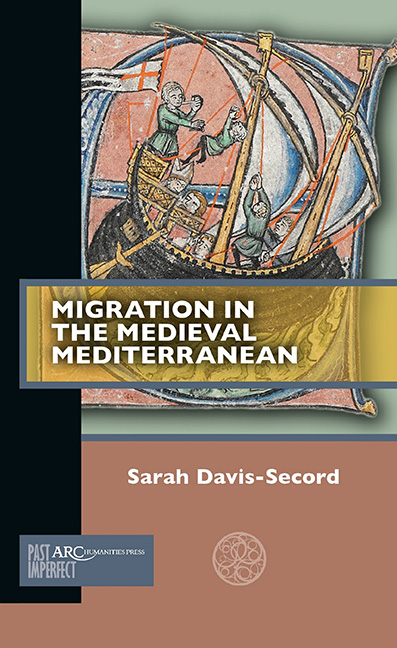Book contents
- Frontmatter
- Contents
- Introduction
- Chapter 1 Refugees from the Islamic Conquests
- Chapter 2 Hadrian and Theodore
- Chapter 3 St. Elias the Younger
- Chapter 4 Constantine the African
- Chapter 5 Jewish Refugees from the Norman Invasion
- Chapter 6 Merchants
- Chapter 7 Imam al-Mazari and Other Muslim Scholars
- Chapter 8 Unnamed Sicilian Girl
- Chapter 9 George of Antioch and Other Immigrants to Sicily
- Chapter 10 Moses Maimonides
- Chapter 11 Religious Converts
- Conclusion
- Further Reading
- Frontmatter
- Contents
- Introduction
- Chapter 1 Refugees from the Islamic Conquests
- Chapter 2 Hadrian and Theodore
- Chapter 3 St. Elias the Younger
- Chapter 4 Constantine the African
- Chapter 5 Jewish Refugees from the Norman Invasion
- Chapter 6 Merchants
- Chapter 7 Imam al-Mazari and Other Muslim Scholars
- Chapter 8 Unnamed Sicilian Girl
- Chapter 9 George of Antioch and Other Immigrants to Sicily
- Chapter 10 Moses Maimonides
- Chapter 11 Religious Converts
- Conclusion
- Further Reading
Summary
Humans have been on the move for as long as they have been human. From the earliest migrations of homo sapiens out of Africa, to the influx of Germanic tribes and Eurasian steppe peoples who crossed the borders of the Roman Empire from the fourth century CE, all the way to the millions of refugees from Africa and the Middle East seeking entry into the European Union today, repeated waves of multidirectional migration have impacted political, cultural, linguistic, economic, and environmental landscapes for millennia. Indeed, large-scale migration has been one of the most influential factors shaping human history, and it shows no signs of stopping. And this fact is especially true when considering the history of the Mediterranean Sea. Just as today the Mediterranean Sea is a conduit for refugees and migrants, so too in the Middle Ages was it the field across which large numbers of people travelled for pilgrimage, politics, or profit, relocated or were relocated against their will, and sought refuge, safety, and gain.
Modern science has confirmed the depth of migration's impact through DNA analysis—of both modern populations and ancient ones. Study of “aDNA” (ancient DNA) is a growing field within archaeology and history. For example, a series of broad-based genetic studies have shown that all modern human populations contain strains of genetic material from wide varieties of different ancient locations; relatedly, they have found that no population's genetic material indicates long-term stability or ethnic purity. In fact, outside of Indigenous Australians, all modern human populations are the genetic result of waves of migration and mixing: that is, historically speaking, migration—not population stability—has been the norm. In other words, the long history of population movements on both large and small scales means that there are no “pure” races or ethnicities.
And while the movement of human populations has an ancient pedigree, it is also the case that from the very earliest phase of human settlement during the Neolithic period, there has been conflict between settled communities and migratory peoples. One of the earliest surviving written stories, The Epic of Gilgamesh, a poem from ancient Mesopotamia, records the fear with which city-dwellers faced the “wild man” of nomadic cultures.
- Type
- Chapter
- Information
- Migration in the Medieval Mediterranean , pp. 1 - 14Publisher: Amsterdam University PressPrint publication year: 2021



